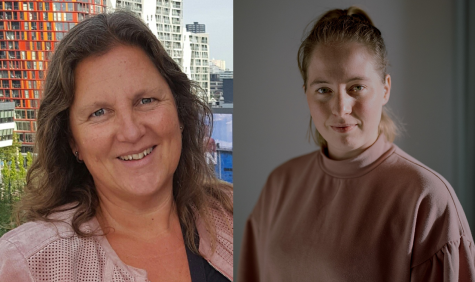"We can really use edubadges to bring about innovation in education and offer education that goes beyond courses and institutions"
With edubadges, we can better differentiate student skills
At Rotterdam University, students get credits for the knowledge they acquire, but how do you reward skills properly? The university uses edubadges to offer differentiation in this respect, so that students acquire skills at the level that suits them and they can make these visible on their CVs.
Suppose you are studying nursing and would like to use robots in your work later, you could include robotics in your learning path. And someone who wants to work in nursing home care could make a completely different choice again. The use of edubadges supports opportunities for flexibility without flipping an entire course.
In 2020, Rotterdam University of Applied Sciences ran a successful pilot with edubadges at their Stadslab Rotterdam and in the media library. They have since deployed edubadges structurally for extracurricular activities. The project unfolded organically from the shop floor. We asked Brenda Lems, adviser on data management of (open) learning materials, and Manon Mostert, senior lecturer and director of Stadslab Rotterdam, why Rotterdam University uses edubadges, what bumps and successes they encountered during implementation and how they see the future of edubadges.
edubadges for extracurricular education
Brenda Lems: "With us, students get credits for their knowledge gained, but we had no system to reward skills gained. From the City Lab came the desire to easily document the minimum skills needed to use equipment (such as 3D printers). The college therefore started the edubadges pilot at the City Lab. From the media library, we have latched on to this. We are currently using the badges for skills that are usually outside the curriculum. Such as information skills or participation in a literature review training. We have now awarded a total of over 300 edu badges."
Gaining skills at own level
Manon Mostert: "We saw within the pilot in the City Lab that we can better differentiate skills offered in workshops, electives or minors with edubadges. This allows students to acquire skills at the level that suits them. This way, you can train skills equally and cross-curricularly. In addition, students can now also choose to expand their skillset themselves, if, for example, the programme does not (yet) pay attention to this." Lems indicates that classification of edubadges is a point of interest. "At which level do you receive which badge and how do you test that in the right way? We use the Dreyfus model for this, where you can demonstrate the degree of independence and the degree of complexity of a skill."
Making choices
Mostert: "We can really use edubadges to innovate education and offer education that goes beyond courses and institutes. But so much is possible, there are so many strategies to deploy. That is why we made a memorandum, in which we make 10 choices around the deployment of edubadges. These choices focus, for example, on the target group, the added value for the student, the way in which assessment is carried out and on the method and phasing of the issue. We have submitted these choices to the various institutes within our college. Once we have made choices on these points, then we can start designing learning paths; the route a student takes to gain knowledge or learn skills."
National coordination on deployment of edubadges
Lems: "In the pilot phase, we did Desk research for edubadges, looking at national alignment. This is difficult because at the moment each institution makes its own choices. Some institutions link edubadges to lessons, others to digital training or physical attendance. That makes it difficult to roll out edubadges nationwide and make them interchangeable. While that is what you want to achieve, in the context of Lifelong Development and the flexibilisation of education. As institutions of higher education, we still have steps to take there anyway. Whereas primary and secondary education work much more with standards, universities generally work with their own quality levels for their skills and content. Until now, we have mainly been each other's competitors. The focus should now be on exchange.
Our teachers are very excited about the edubadges; in the past, they provided a certificate of participation, but now they can also award a badge.
In full development
Lems: "Our teachers are very enthusiastic about the edubadges; in the past they provided a certificate of participation, but now they can also award a badge. The quality check does not lie with the teacher but with educational advisors who co-develop the tests. Testing and awarding is still all manual work at the moment, so that is also a challenge when we start using this more widely within our university; how can we automate this better? We opted not to make the whole project very policy-driven, but to implement it from the shop floor.
Lots of enthusiasm from different corners
There is an increasingly enthusiastic response from several quarters to the possibilities offered by edubadges. There is now a lot of demand for edubadges from the university's economic and technical domain, but the Honours programmes are also increasingly taking advantage of these opportunities. We also feel international pressure. In exchanges and joint activities with foreign universities, the question comes up: 'Can't we award an edu badge for this activity?'"
Teachers and students have first good experiences
Mostert: "Every Friday, our teachers are allowed to have their skills tested so that they can experience for themselves what it is like to get an edu badge. Now that they are experiencing it themselves, edubadges are becoming more familiar and less 'scary' within the group of teachers. It is a kind of informal in-service training. Many students also find edubadges very interesting. They really like the possibility of differentiation, that skills can be offered on a level. For example, we have many multidisciplinary minors. Some students then think: 'That's not new to me'. When they then see that there is an offer for them at the right level, a whole new world opens up to them. That is the coolest thing about our work, you see those eyes sparkle. A light really goes on: I can do this now and tomorrow I want to learn that!"
* the photo of Manon Mostert was taken by Wouter le Duc

